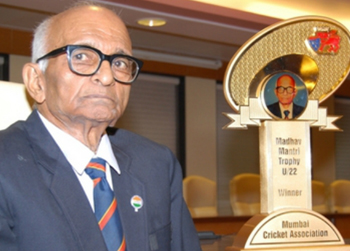Dubai, Feb 11: Two Indian players-- Akash Singh and Ravi Bishnoi -- and three Bangladeshis have been charged by the International Cricket Council (ICC) for involvement in the quarrel just after the U-19 cricket World Cup summit clash in Potchefstroom, South Africa on Sunday.
Akash and Bishnoi and three Bangladeshi players -- Md. Towhid Hridoy, Shamim Hossain and Rakibul Hasan -- were found guilty of breaching the ICC Code of Conduct after a few players from both sides nearly came to blows after Bangladesh beat India by three wickets to win their maiden U-19 World Cup title.
"Five players have been found guilty of a Level 3 breach of the ICC Code of Conduct for Players and Support Personnel ... (they) were charged with violating Article 2.21 of the code, whilst Bishnoi received a further charge of breaching Article 2.5," the ICC said in a statement.
"All five players have accepted the sanctions proposed by ICC U-19 Cricket World Cup Match Referee Graeme Labrooy," it added.
A near brawl broke out after Bangladesh’s historic win over India in the final. The Bangladesh players were aggressive during the Indian innings with lead pacer Shoriful Islam frequently sledging the Indian batsmen.
As soon as the match ended, Bangladeshi players rushed into the playing area.
"India's Akash accepted the charge of breaching Article 2.21 and has received a sanction of eight suspension points, which equates to six demerit points, which will remain on his record for two years," the ICC said.
Compatriot Bishnoi accepted the charge of breaching Article 2.21 and has received a sanction of five suspension points, which equates to five demerit points.
"Bishnoi also accepted a level 1 charge of breaching Article 2.5 for a separate incident during the match, where he used language, actions or gestures which disparage or which could provoke an aggressive reaction from a batter following the dismissal of Avishek Das in the 23rd over," said the ICC.
"For this he received a further two demerit points meaning seven demerit points will remain on his record for the next two years."
Bangladesh's Towhid Hridoy accepted the charge of breaching Article 2.21 and has received a sanction of ten suspension points, which equates to six demerit points, which will remain on his record for two years.
Shamim Hossain accepted the charge of breaching Article 2.21 and has received a sanction of eight suspension points, which equates to six demerit points, which will remain on his record for two years.
Rakibul Hasan accepted the charge of breaching Article 2.21 and has received a sanction of four suspension points, which equates to five demerit points, which will remain on his record for two years.
All charges were levelled by on-field umpires Sam Nogajski and Adrian Holdstock, third umpire Ravindra Wimalasiri as well as fourth umpire Patrick Bongni Jele. Level 3 breaches carry a minimum penalty of four suspension points and a maximum penalty of 12 suspension points.
The suspension points will be applied to the forthcoming international matches the players are most likely to participate in at either senior or U-19 level. One suspension point equals a player being ineligible for one ODI or T20I, U-19 or A team international match.
 Mumbai, May 23: Madhav Mantri, who was India’s oldest living Test cricketer at 92 years and 244 days, passed away of a heart attack at Leelavati Hospital on Friday morning.
Mumbai, May 23: Madhav Mantri, who was India’s oldest living Test cricketer at 92 years and 244 days, passed away of a heart attack at Leelavati Hospital on Friday morning.




Comments
Add new comment